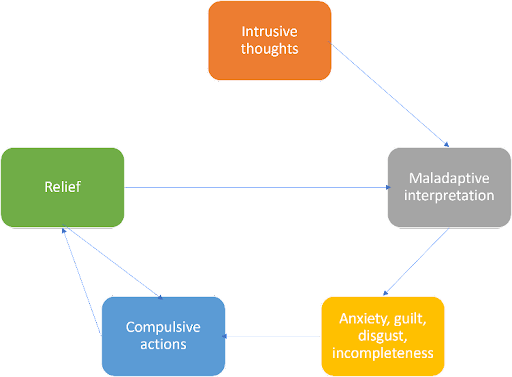Exposure and Response Prevention (ERP) therapy is a gold standard psychological intervention for individuals grappling with Obsessive-Compulsive Disorder (OCD). To understand the use of ERP in the treatment of OCD, it is essential to first understand the inherent cycle of OCD.

In this article, Ms. Siew Choo Ting, Principal Psychologist at Private Space Medical, speaks about breaking the chain of Obsessive-Compulsive Disorder with Exposure Response Prevention
I often illustrate this with an analogy – a car alarm is a very helpful device that warns us when someone is trying to break into our car. However, if it starts going off whenever the wind blows or if someone walks near it, it is not a helpful signal of danger anymore. In OCD, the alarm system activates even in low-risk situations (maladaptive interpretation), convincing individuals they are in imminent danger. The individuals then engage in compulsive behaviours in an attempt to keep themselves safe. Subsequently, these compulsive behaviours offer momentary relief, reinforcing the notion that the initial thought was indeed dangerous and warrants the engagement in compulsive behaviours in the future. Over time, however, individuals fail to learn that these obsessions pose no real threat, and discomfort naturally subsides without resorting to compulsive actions.
ERP, as the name suggests, comprises two elements – (1) Exposure, or systematically confronting feared situations, images, objects, or thoughts that trigger obsessive tendencies, and (2) Response Prevention, which entails not performing the ritualistic behaviours to alleviate distress. By preventing the compulsive responses, ERP disrupts the reinforcement of the obsessive-compulsive cycle, facilitating habituation and desensitisation, and a mental “retraining” that diminishes the perceived threat of the obsession.
It can sound daunting to purposefully expose yourself to feared situations like this. Many of my clients also shared with me that they have attempted exposures on their own to no avail – they become too distressed that they still have to perform their compulsions in the end. These feelings and concerns are absolutely valid; confronting our fears is challenging, and purposely putting ourselves in positions of discomfort is no walk in the park. However, when done under the guidance of a trained clinician, ERP can be much more manageable.

In ERP, conduct an initial assessment to pinpoint the underlying fear of OCD. Collaboratively, clients and clinicians establish a hierarchy of anxiety-inducing situations, graded from least to most distressing, using the identified fear as a foundation for exposures. Beginning with lower-level exposures, individuals learn to sit with the discomfort without resorting to compulsive behaviours. This cultivates skills in making space for difficult feelings and thoughts, and clients learn that while these are distressing, they cannot hurt them. Often, when we stop fighting the obsessions and anxiety, the age-old saying of “what goes up must come down” comes into play – the discomfort will eventually subside. Once we have built skills and mastery for the lower-level anxiety-provoking situations, we then gradually progress to more challenging ones. Clinicians will also discuss with you along the way on how to break the exposure tasks down into smaller and more manageable steps, respecting each individual’s pace.
Research consistently supports ERP’s efficacy, making it a first-line treatment for OCD. The structured and evidence-based approach of ERP empowers individuals to confront fears, interrupt ritualistic responses, and eventually reclaim control over their lives and experience significant improvements in their overall well-being.
Seek Help Today
Take the first step towards unlocking your potential for growth and well-being. Contact us to embark on your OCD Therapy journey.

